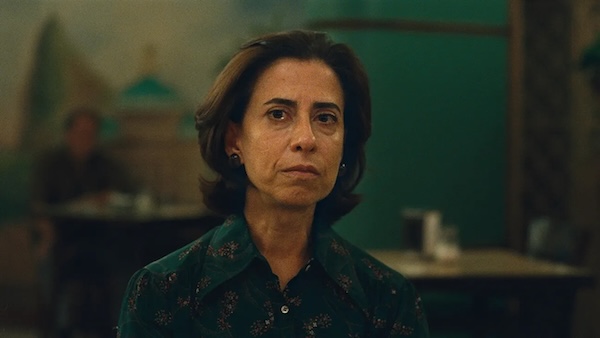Film Review: “I’m Still Here” — They’re Still Here
By Peter Keough
Fascism is faced down in Walter Salles’ Oscar-nominated masterpiece
I’m Still Here. Directed by Walter Salles. At the Coolidge Corner, Kendall Square, and in the suburbs.

Fernanda Torres in I’m Still Here. Photo: Courtesy of Venice Film Festival
Unlike those of us who may soon be facing similar circumstances, the Paiva family in Walter Salles’s subdued, quietly devastating I’m Still Here were already familiar with the ways of a totalitarian regime, having lived under one in Brazil for about six years.
But it still comes as a surprise to them, as the film opens, to look up while swimming and see a military helicopter pass over at low altitude (no one yet knew about the political prisoners dumped into the sea). Or see a convoy of trucks loaded with soldiers roar by as the family poses at the beach for a photo. So when the teenage daughter shoots a super 8 as she rides home from a screening of Blow-Up with her countercultural friends (it is 1970), and they pass a joint and turn up the music on the radio, it seems somehow inevitable that they will be stopped at a roadblock and roughed up by moronic soldiers (luckily one of her friends has his lawyer father’s bar membership card).
Despite this, life goes on more or less as usual. The father, Rubens Paiva (Selton Mello), a former Congressman from a liberal party who had briefly fled into exile in the ’60s, is now a respectable engineer making a good living, and he and his down-to-earth wife Eunice (Fernanda Torres) keep his lively but well-behaved daughters and son up to date with the latest fashions and record albums and other trendy treats. The sprawling family house maintains lively dinners and parties attended by their friends, lefties like themselves, some lying low for the duration, and others planning to relocate to safer havens like London as the political situation worsens. Meanwhile, there are still those odd phone calls that Rubens receives, the late night delivery of packages, his meetings with colleagues that might or might not be business related.
But the night finally comes when a crew of raffish, armed thugs slink in and take Rubens away somewhere “to answer some questions.” Some of the intruders remain to search the place and keep watch. At first it seems like they’re not all a bad lot, as one sorts through the record collection approvingly and another plays foosball with the boy.
But any illusion of good cops vanishes when Eunice and one of the teenage daughters are picked up by government goons who throw black bags over their heads and take them away to an army prison. There Eunice is separated from her daughter and undergoes the first of many interrogations in a room with bloodstains on the floor and with muffled screams echoing from outside. These frightening sessions are repeated; she is asked to identify mug shots in a thick album. She refuses to do so until she recognizes first Rubens’s picture, then her own, then her daughter’s. She scratches the days off on the cement wall of her cell until, by the time she is released, she has been transformed by terror, loss, injustice, and rage from a decent upper middle-class housewife into a cold, patient, and relentless avenger seeking the truth about her husband’s fate. She is a heroine for our time, wrenchingly depicted by Torres in a subtle and sublime Oscar-nominated performance.
Based on the memoir by Rubens and Eunice’s son Marcelo Rubens Paiva, I’m Still Here – nominated for Best Motion Picture and Best International Feature Oscars – enters the canon of films about the fascist takeover of Latin American democracies. These range from Chilean Patricio Guzmán’s The Battle of Chile: The Struggle of an Unarmed People (1975), to Mexican Alfonso Cuarón’s Roma (2018), to Argentine Luis Puenzo’s The Official Story (1985). Hollywood versions include Costa-Gavras’s Missing (1982), Robert Spottiswoode’s Under Fire (1983), and Oliver Stone’s Salvador (1986). (A recent favorite of my own is the Chilean Pablo Lorrain’s 2023 genre-bending El Conde.)
This is not a perfect film. There are periodic conventional touches (the days scratched on the cell wall, a cute puppy, a lost tooth, a soufflé) that might be just a tad too generic. And it ends with not one, but two epilogues — two too many I would say, set in 1996 and 2014. These leave you thinking that democracy had been fully restored (the military junta in the film lasted from 1964 to 1985) and that justice — incomplete, overdue, and bittersweet though it might have been — had finally triumphed. In fact, democracy took another hit in 2019 when the country elected the bumptious, right-wing sociopath Jair Bolsonaro as President. Fortunately, he was rejected by voters in 2023, and last November Bolsonaro and 36 others were formally charged with plotting a coup d’état and other crimes against the state. A lesson in common sense that another, supposedly more established democracy, failed to learn.
Peter Keough writes about film and other topics and has contributed to numerous publications. He had been the film editor of the Boston Phoenix from 1989 to its demise in 2013 and has edited three books on film, most recently For Kids of All Ages: The National Society of Film Critics on Children’s Movies (Rowman & Littlefield, 2019).


It doesn’t take long ~~~ a few seconds ~~~ to think of where we are! And in the end, a beautifully controlled Altmanesque stunner!